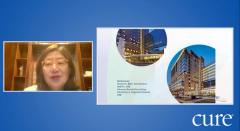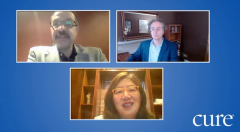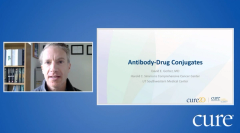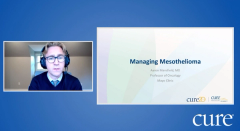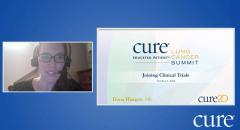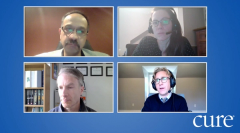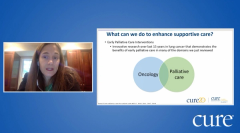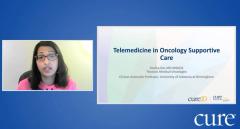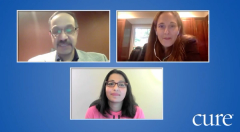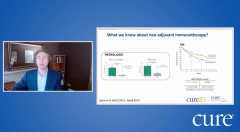
Educated Patient® Lung Cancer Summit Management of Advanced/Metastatic Disease Panel: October 1, 2022
Watch Dr. Hossein Borghaei, Dr. David Gerber, Dr. Aaron S. Mansfield and Dana M. Haagen answer questions on the management of advanced/metastatic disease during the CURE Educated Patient Lung Cancer Summit.
Episodes in this series

The Management of Advanced/Metastatic Disease Panel was moderated by Dr. Hossein Borghaei, and included Dr. David Gerber, Dr. Aaron S. Mansfield and Dana M. Haagen.
Borghaei: Dr. Mansfield, is there any biomarker testing in mesothelioma at this point?
Mansfield: So, yes and no. Based on the application, there is a mesothelin test that could be done. Mesothelin is a protein that's expressed not just on mesothelioma tumors, but other tumors as well. And there's some evidence that you could use this to track the mesothelioma. But it's really hard to screen for the disease and interpret those findings. We are using BAP1 mutations and other DNA repair gene mutations to try to sort out who may or may not benefit more so from immunotherapy or chemotherapy, so I think we'll see more data on that published, but we don't have a ready biomarker like we do in adenocarcinoma of non-small cell lung cancer.
Borghaei: Are there efforts underway to try to identify molecular drivers, so to speak for mesothelioma?
Mansfield: TCGA I think had one of the largest efforts. And the problem is the majority of the mutations affect tumor suppressor genes, not oncogenes, so you have to get more creative as to how you attack the tumor. And one way might be as Dr. Gerber presented with antibody drug conjugates. And there's been a major effort to develop an antibody drug conjugate that targets mesothelin cells, but the chemotherapy they attached it to ended up being no better than giving a very similar version of that drug intravenously without the attachment to the key of the antibody. So we didn't see a great improvement in efficacy or a reduction in toxicity with that approach. There might be other targets. But right now, I think that antibody drug conjugates for mesothelioma is not as active as the dendritic cell vaccine space, the CAR T space, is still going after mesothelin, not other targets. And then we're trying to get better with sort of the second order effects when CDKN2A is lost, can you use the CDK4/6 inhibitor with great efficacy? And I think what we've seen so far is there's a mild benefit from doing so.
Borghaei: We have a question for you. As is an ADC contraindicated with an EGFR mutation? I'm assuming again, interpreting the question, I don't think there's any contraindication. But what are your thoughts on that?
Gerber: Yeah, so you know, so there are a couple of questions to ask anytime you're thinking about the ADC. And we kind of went through those before, the nature of the cancer and the nature of the ADC. So let's think about the nature of the cancer in EGFR-mutant lung cancer. Well, the target is the EGFR molecule, and that target has an extracellular component, so an antibody could attach to it. And well not in lung cancer. We do use anti-EGFR antibodies that are not ADC, just regular antibodies against EGFR, as I mentioned before for colon cancer and head neck cancer. One of the issues that comes into play with an ADC against EGFR, for example, because that EGFR that is also expressed are present on a lot of normal tissues, the skin, the lining of the mouth, and the GI tract, the lining of the eyes, and anti-EGFR ADCs have been studied. And I've had really bad toxicities because of the distribution of the target and normal tissues.
So could you use a different antibody drug conjugate in EGFR-mutant lung cancer? Well, I think if you had a different target, besides EGFR, that were in that cancer cell that were not in healthy tissues to great extent, absolutely. And we do have clinical trials that are enrolling patients for treatment with ADC and those patients have EGFR-mutant lung cancer. They just tend not to be anti-EGFR ADCs. But some of the other targets that might be relevant in EGFR new cases, like HER2 or HER3, and it's important to remember that another word for EGFR is HER1. So they're all related, the trope to that I mentioned, the axial target. So there are a lot of potential uses for ADCs in EGFR-mutant lung cancer at this point in time, they remain under investigation. And so far, none of them looks as effective as the approved oral EGFR inhibitors we're using now, but might be used after those drugs fail on the patient progresses.
Borghaei: Excellent. Thank you. So the question is, is there financial support if you join a clinical trial?
Haagen: That's a really good question. So sometimes sponsors will offer reimbursement or other financial assistance related to transportation and to offset the costs associated with having to come back and forth from the center so frequently, are to offset inconveniences, so to speak. And then the sponsor themselves, in many of the interventional clinical trials, are responsible for covering the costs of things that are not considered standard of care, are not considered outside of what would be considered standard of care for monitoring someone on cancer treatment. So going on a clinical trial doesn't mean that you won't necessarily have any co-pays or anything related to your care. But part of what goes into starting a clinical trial is a review to ensure that things that are being ordered and specifically done for the study are billed appropriately to the sponsor. And then some trials do offer certain reimbursements and other things. But all of those would be discussed in the clinical trial informed consent document, and can be reviewed and discussed too. A lot of our organizations have specific research financial counselors that assist with this process and it can help answer additional nuanced questions as you break down each of the different procedures.
Borghaei: Excellent. Thank you. Dr. Gerber, I'm going to come back to you with this one. And Dr. Mansfield please jump in. So this is a question that I think we get often and now that we're doing all these molecular testing. So we have a question regarding the fact that someone has an EGFR-positive non-small cell lung cancer, and at the same time, there is a KIT amplification detected on testing. And the question really is, what is the relevance of a KIT amplification? And what are the differences between an amplification and a mutation? I know this gets to be a little bit more complicated, but perhaps if you can discuss briefly what the differences are between an amplification and a mutation, and how we use some of these other information that we see in molecular testing that will be helpful for our audience.
Gerber: I think that's actually a really great question. So when we think about the molecular abnormalities that can occur in lung cancer and other malignancies, the term mutation is one specific example. You'll hear many of us, I think Dr. Mansfield might have used this term, he might have said alteration, which is our fancy way of saying abnormality. And that's a really broad term. So for example, when we talk about EGFR and lung cancer, we use the term EGFR mutation. But you don't usually hear us use the term ALK-mutant lung cancer, you hear us say ALK-positive lung cancer, and that's because the genetic or genomic change that's occurring to help initially, and those rare types of lung cancer is not technically a mutation.
So what do I consider a mutation? I consider a mutation, for example, if what I'm looking at, part of a gene, something that's supposed to look one way is substituted just to look like something different, okay, or something that's supposed to be there is gone and call that a deletion. Those are two common forms of mutations. But what are some other things that can happen to genes inside a cancer that could be abnormal but not mutations? You could have the gene, for whatever reason just moved to a different area than where it normally is. That's a rearrangement. That's what ALK is. Or you could have multiple copies of the gene instead of just one, it could be repeated. That could be an amplification.
It's also really important to remember that when we're using all of these terms, even though we're talking about genes, even though you may hear the term genetic, we're almost never talking about inherited conditions in lung cancer. This is just something happening to the genes or the DNA in the cancer, not in other parts of the body. So it's not getting passed on to children, or siblings aren't at risk. This is not sickle cell anemia. This is not cystic fibrosis.
So as for KIT, there are amplifications that can occur in lung cancer. They can occur in thymomas. They can occur in some hematologic malignancies, and one of the slides that I showed before, was comparing the antibodies Cyramza (ramucirumab) to the oral targeted therapy Sutent (sunitinib), and one of the targets of Sutent was KIT. Turns out that in rare cases of thymoma, or in some hematologic malignancies like lymphomas or leukemias targeting KIT appears to be pretty helpful. So far in lung cancer, to my knowledge, and probably also mesothelioma, targeting KIT doesn't seem to be that helpful or relevant. And one of the reasons why might be that even if KIT is abnormal in a lung cancer, that abnormality may not be what's making the lung cancer develop, grow or spread, may not be driving it.
Borghaei: Oh, that was actually great. Dr. Mansfield, anything to add, especially about the amplification part like you have a KIT amplification versus a mutation? Would you look at treatment options differently?
Mansfield: I would not adjust my initial treatment recommendation. Say for this case with EGFR, I would prefer we target that with the drug with a known, proven benefit in this disease. I would think of using the KIT amplification information in the clinical trial arena, if the (Tagrisso [osimertinib]) has failed, or we're looking for trial options at that time, in a few different ways, is there a new KIT inhibitor or something we should think of applying? Also, NCI trials are opening for patients with multiple events where you have a mutation and another event where you're giving combination targeted therapies. But those studies are being based on a lot of work that’s been done in the lab to prove that targeting both targets is beneficial. So I think there's more to say as to whether that will help. It might be toxic when you're giving two of these drugs together. When you're not doing this in a trial setting, I feel like you're really far out in terms of safety for patients. So I would consider it but in the context of trial options. And then just to say one more thing, some mutations or amplifications may not be, and Dr. Gerber said this, to an extent but may not be the driver event. Some things that co-occur are passengers and are not the clear drivers of the tumor, and you could end up chasing your tail sometimes.
Borghaei: That's great. We're going to change the program a little bit. We did not discuss this. This is not part of the sessions we have this morning. But we have had a number of questions regarding the hereditary nature of lung cancer and since Dr. Gerber opened the door by his response, which I think was very good, I just want to have a couple of additional comments from each of you. Do you consider lung cancer a hereditary event? Is there any evidence to suggest that a family member who has lung cancer necessarily predisposes an individual who doesn't have lung cancer now to lung cancer? What do we know about the genetics and heredity ability of lung cancer spectrum?
Mansfield: I would say, in general, unlike the BRCA1/BRCA2 situation for breast or ovarian cancers or others, it there's not a strong association between a single gene or set of genes and the heritability of lung cancer. That being said, I have some very rare patients where both siblings have the same germline EGFR mutation, meaning that their normal cells also have the same EGFR mutation as the tumor cells. So this is a 1 in a million deal, and not the common pattern. So the answer could be yes. But on average, I don't think it is. I think there are some associations with families. But I do think it's confounded by the tobacco exposure and secondhand exposure and other factors.
Gerber: I think it's important also to make a distinction between something that's genetic and something that might be familial. So in breast cancer, there's a proportion of cases that seemed to cluster in families, but only a tiny fraction of those actually have the BRCA mutation. So for whatever reason, is it because of environmental exposures? Is it because of genetic things happening that aren't being tested? We don't know.
So in lung cancer, I've been doing this for a very long time, I have treated several 100 patients with lung cancer. And I have had one case in my career where we identified a genetic abnormality in a patient, and siblings and a parent. And it was so rare that we published it in a really good journal. So I don't know, is that 1 in 1,000? Is that 1 in 2,000? Very, very rare.
Now, if a family member does have lung cancer, does that make someone else at a higher risk? Well, one way to try to answer that question is, how do we approach screening for lung cancer? Does someone's family history in any way affect your eligibility? On terms of how the US government approaches lung cancer screening, it's based on only two things, right? It's based on how old you are and how much you smoked. There's nothing in there that says if you've had a family member with lung cancer, you may want to think about doing it earlier more often. And that's different than something like colon cancer, where if you've had a family member, the recommendation for colon cancer, the recommendation for your screening might start at an earlier age. Otherwise it gets a little bit more complicated because some other organizations besides the government screening arm that we call the USPSTF, start to mention thoughts about family history and screening recommendations. We look to the NCCN, or the National Comprehensive Cancer Network, for treatment guidelines all the time. Less often do we rely on the NCCN for screening guidelines. But the last time I checked, the NCCN said if someone has a family history of lung cancer, you may want to think about screening a little bit differently than you would otherwise. But I don't think people are really acting on that at this point.
Borghaei: Great, I hope that provides at least some answer to our fellow patients and advocates and family members who are on the call. I think that was as comprehensive of an answer that could have come up. So thank you both.
Dana, I'm going to come back to you. Are there specific lung cancer advocacy groups that can help patients find clinical trials? In other words, what resources are there instead of going to every institution, one by one, to find active clinical trials for participation?
Haagen: No, absolutely. And I named a few, the NCI National Cancer Institute and other organizations have dedicated people available to answer questions and to provide additional resources to make that connection for how to get in touch with the nurse navigator at specific institutions that have clinical trials. So, they are the link or the middleman to identify if an institution could potentially have a clinical trial that you might be eligible for. And certainly, always a discussion with your treating physician to open those doors and to keep communication open about what you're looking for, whether or not you'd be willing to travel to another institution, or what other clinical trial options might be available that fit in terms of your lifestyle and what you're looking for.
Borghaei: Yeah, I certainly think the clinicaltrials.gov website is a good source for finding active clinical trials that you can put in the zip code and find something within drivable distance or manageable distance, let's say, within your zip code. So there is a lot of information on that. I don't unfortunately know if specific advocacy groups have the clinical trial access on their website, I think it is something that all of us are interested in. But I think at this point, the clinicaltrials.gov is the best site that I'm aware of, unless my colleagues know of other sites that we can direct our patients to.
Gerber: I think at most major cancer centers, there's typically something like a hotline, specifically to connect people with clinical trials. Because that's a pretty specialized question and not something that has to do with where do I park my car or what are your hours, so you're usually able to get guidance at that level too.
Transcription edited for clarity.
For more news on cancer updates, research and education, don’t forget to

